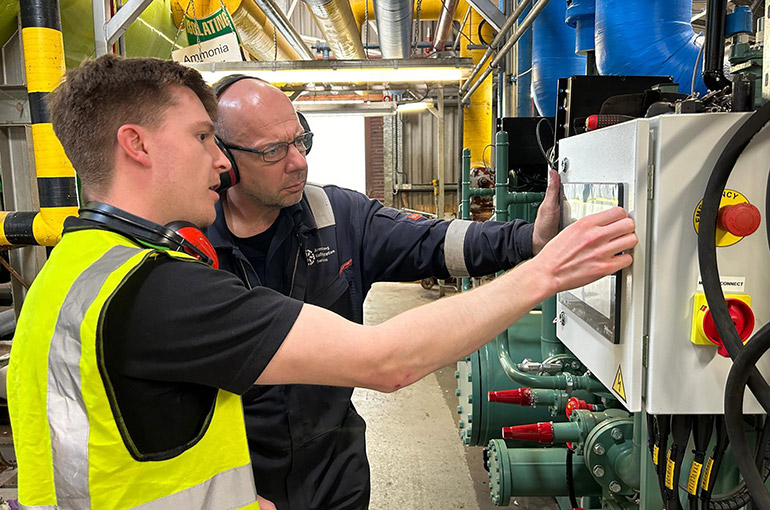05 February 2025
|
A high-efficiency Bitzer ammonia refrigeration system installed by Armstrong Refrigeration Services at frozen food specialist Greenyard is delivering significant carbon savings and reducing cooling energy costs by more than £100,000 a year.
The Ammonia Compressor Pack, model ACP-85, provides up to 310kW of cooling to a large frozen food store for high quality fruit and vegetables at Greenyard's site at Boston, Lincolnshire.
The inverter-driven pack replaces a system by another manufacturer that was nearing the end of its working life, and proving inefficient and costly to maintain.
Ben Armstrong, Director of Armstrong Refrigeration Services, who headed the project, said: "The customer's main requirements were to reduce energy consumption, cut servicing costs and provide the necessary cooling duty with a compact solution that could be accommodated in the plant room, given the space constraints.
"The existing pack was to be retained for use as a standby unit, and available space was limited. The Bitzer ACP pack is highly reliable and efficient, and packs a lot of cooling into a very compact footprint. It was an ideal solution."
The unit was the first ACP pack installed by Armstrong and the project was completed without a hitch, with commissioning specialists from Bitzer UK and Germany attending site to provide technical support.
"We planned the project carefully to minimise cooling down-time, and the switchover from the existing plant to the new BITZER ACP was completed in just half a day," added Armstrong.
Since the system was installed, energy use has fallen by 20%, delivering savings in running costs of more than £100,000 over a full year. When savings in servicing costs are added, pay-back on the project is anticipated to be comfortably less than one year.
Paul Spurrell, Greenyard Project and Utility Engineering Services Manager, said: "Sustainability and reducing the environmental impact of our operations is a key focus for our business. Our strategic goal is to cut CO2 emissions by 50% by 2025 (from 2020 baseline), and by 70% by 2030. The new Bitzer ammonia refrigeration system helps us meet these targets, as well as reducing energy and servicing costs. It's a win-win for the business and the environment."
Chris Hodgson, Greenyard Engineering Supervisor, said: “We worked closely with Armstrong Refrigeration to plan the installation, and ensure the switch-over was as seamless as possible. With commissioning support from Bitzer staff, the project was delivered as planned, and the new plant is performing smoothly and efficiently.”
Following the project's success, a second ACP refrigeration system has been specified to replace another end-of-life pack at Greenyard's Boston site.
Bitzer's ACP range has been designed to meet the requirement for very high efficiency cooling for industrial applications with a zero Global Warming Potential (GWP) refrigerant. In addition to part-load efficiency, it is said to offer outstanding resilience, with a back-up compressor in the unlikely event of a failure, and rapid commissioning due to its plug-and-play design.

Bitzer UK provided on-site commissioning support for the project
Adding to the inherent efficiency of screw compressors, the speed of the lead compressor is controlled by an integrated Variable Speed Drive (VSD), which significantly increases part-load efficiency and enables soft-start, important on sites with limited power headroom.
Kevin Glass, Managing Director of Bitzer UK, said: “Ammonia refrigeration systems have traditionally been built as one-offs, often in less than ideal conditions. Bitzer is able to build ACP units in a high quality factory environment, ensuring the highest possible system integrity, essential when working with ammonia.
“Armstrong Refrigeration’s project for Greenyard is an excellent example of ACP’s environmental and cost-saving benefits, with the anticipated short pay-back time making it highly attractive.”
A further benefit for end users is that the screw compressors used on ACP have much longer maintenance intervals than reciprocating compressors, further reducing the cost of ownership over the plant's lifetime.








